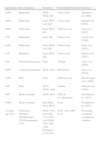Cryptoccoccus neoformans is an encapsulated biotrophic fungus that is transmitted as an aerosol.1 Its origin has been identified in Eucalyptus camaldulensis, its infective forms are basidiospores and encapsulated yeast, and its vector is dried bird droppings, especially from pigeons.1 Cryptococcal infections were commonly found in immunocompromised persons with alterations in cellular immunity.2 Since the introduction of highly active antiretroviral therapy (HAART), the incidence of these infections has decreased dramatically due to better virological and immunological control, due to the decrease in viral load and increase in CD42 cell count. Cryptococcal infections have been reported in patients with a history of prolonged use of corticosteroids, diabetes, renal disease, immunosuppressive therapy, solid organ transplant, lymphoma, sarcoidosis and idiopathic lymphopenia CD42. The cases of cryptococcal infection in patients with rheumatoid arthritis (RA) are limited to a few papers, and when reviewing the literature there are only 3 reported cases of cryptococcal meningitis as the admission diagnosis. We report the case of a young patient with RA, who was not undergoing biological therapy and presented a meningoencephalic syndrome. The patient is a 49-year-old woman with a history of RA for the past 5 years, treated with methotrexate 15mg weekly and prednisone 15mg/day; she came to the emergency department due to having suffered 4 days of intense occipital headache, progressive, incoherent speech, disorientation, with memory problems, drowsiness, and in the last 24h, fever. Upon neurological examination she was markedly confused, with impaired memory, judgment and altered calculus and ocular tenderness. Laboratory tests showed: ESR: 63mm/h; CRP 8.3mg/dl; glucose 353mg/dl, sodium 134mg/dl. It was initially considered as a meningoencephalic syndrome. Lumbar puncture was performed, with an opening pressure of 31cm H2O, low glucose 20mg/dl, protein of 111mg/dl, WBC 14mm3, neutrophils 16%, lymphocytes 84 found %, gram stain + + + yeast and bacterial antigens, with encapsulated blastoconidias found after staining with China ink, compatible with Criyptococcus sp. Methotrexate and prednisone were discontinued or decreased. We started treatment with amphotericin B, in increasing doses up to 1g intravenously, with an adequate clinical response and infection control. Due to the presence of de novo diabetes mellitus, treatment with insulin was started based on a recommendation of endocrinology.
Opportunistic CNS infections reported in patients with RA include progressive multifocal encephalopathy, aspergilloma, tuberculosis, infection with West Nile virus, bacterial meningitis, infection with rodococcus and cryptococcal meningitis; however, the patients who have been reported with these types of infection were undergoing biological therapy.3–5 Cryptococcal infections reported in RA patients are summarized in Table 1.6,8,9 When evaluating Table 1, it can be seen that most Cryptococcal infections in patients with RA present in the lungs,10 followed by skin and meninges; one case showed spreading with multiorgan involvement and deadly consequences. The average age of presentation for any cryptococcal infection is 63.8 years (range: 47–82 years); the most frequently associated drugs are methotrexate and prednisone in 75% of cases. 66% of the patients who developed infections due to this micro-organism were on biological therapy. Of the 3 patients who presented cryptococcal meningitis, only the patient reported in this case was not undergoing biological therapy.
Cryptococcal Infections Reported in Patients With Rheumatoid Arthritis.
| Age/Gender | Site of infection | Treatment | Comorbidity/Outcome | Reference |
| 65/M | Pulmonary | MTX, HXQ, Infl | No/recovery | Shrestha et al. (2004) |
| 44/M | Pulmonary | Pred, MTX, Lefl, Infl | No/recovery | Starrett et al. (2002) |
| 69/M | Pulmonary | Pred, MTX, Infl | DM2/recovery | True et al. (2002) |
| 47/F | Pulmonary | Pred, Infl | No/recovery | Arend et al. (2004) |
| 61/M | Pulmonary | Pred, MTX, Lefl, Infl | No/recovery | Hage et al. (2003) |
| 67/F | Meninges | Pred, MTX, Infl | No/recovery | Muñoz et al. (2007) |
| 82/F | Pulmonary/meninges | Pred | ?/Death | Tajiri et al. (2009) |
| 80/M | Leather/disseminated | MTX, Pred | ERC/death | Diaz et al. (2010) |
| 74/M | Skin | Pred | DM2/recovery | Moosbrugger et al. (2008) |
| 58/F | Skin | MTX, HXQ, Adal | Trauma | Morgan et al. (2008) |
| 49/F | Brain-meninges | MTX, Pred | DM2 de novo/treatment | Threshing et al. (2012) |
| 70/M | Brain-meninges | Infl, Ritux, Pred, MTX | None | Wingfield et al. (2011) |
| Average age: 63.8 | Pulmonary: 50%Skin: 16%Meninges: 16%Disseminated: 8.3% | MTX: 75%; Pred: Infl 75%: 50%; Lefl: HXQ 16%: 16%; Adal: Biological 8.3%: 66% | DM2: 16%; ERC: 8.3% | Percentage of patients according to variables |
Adal: adalimumab; DM2: type 2 diabetes mellitus; F: female; HXQ: hydroxychloroquine; Infl: infliximab; Lefl: leflunomide; M: male; MTX: methotrexate; Pred: prednisolone; Ritux: rituximab.
Source: based on Muñoz et al. (2007).7
In conclusion, we report a case of cryptococcal meningitis in a patient with RA in non-biological antirheumatic treatment (glucocorticoids and methotrexate).
Please cite this article as: Trillos RF, Fernández-Ávila DG, Díaz MC, Gutiérrez JM. Meningoencefalitis criptococócica en una paciente con artritis reumatoide tratada con metotrexato y prednisona. Reumatol Clin. 2014;10:346–347.









